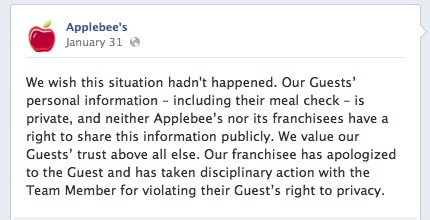Ahh social media. The online medium that simultaneously has the power to influence positive buzz and notoriety for a company or disastrous PR blunders and lost jobs.
An effective social media policy can be confusing to piece together for some startups, says Wisconsin-based social marketing platform Shoutlet, but getting there sets a solid foundation for employees to confidently talk about the brand.
Some policies are highly tactical, some are full of legalese, and some are nothing more than common-sense guidelines. Nevertheless, it sets expectations for behaviour, helps prevent a PR crisis, and can give you recourse against employee actions.
Shoutlet has provided us with their “10 Guidelines to Include in Your Social Media Policy,” a rough guide to the social policy that’s unique to a company.
1. Include language that prohibits the sharing of confidential information or information that is not compliant with the regulations in your industry
Set boundaries for what company culture can be shared online. Be specific by adding examples of what is considered confidential. Best Buy’s social media policy lists specific things to keep confidential including financial information, promotions or inventory levels, and internal publications. “Basically, if you find yourself wondering if you can talk about something you learned at work – don’t. Follow Best Buy’s policies and live the company’s values and philosophies. They’re there for a reason,” said Best Buy. For companies in highly regulated industries, sharing certain information or advice will go against regulatory compliance guidelines. A July 2013 Forrester report lists at least 13 relevant regulatory bodies that provide social media guidance to their respective industries. Work with your legal advisors to craft a social media policy that addresses each of the regulatory guidelines applicable to your company.
2. Encourage employees to identify themselves as representatives of the company.
American Family Insurance encourages people to do this in both their employee policies and social media policies for agents using social media to connect with clients. “We ask agents to be transparent anytime they’re talking about the company or products, so people are clear you’re speaking from that role,” said social media representative Collin Kromke.
3. Instruct employees when they can use the company name within their social usernames (if at all).
Provide clear rules and an internal contact to speak to on how and when they can set up a corporate-sanctioned account.
4. Update people on copyright laws
With the abundance of free online media, such as Google Images, it’s important to remind people there are rules about how they use it.
5. Suggest employees avoid engaging in arguments or debates.
When employees get in flame wars, it can cast your company in a negative light. Remind people to be respectful by including a guideline similar to American Family’s: “Do not engage in arguments or post inflammatory comments or statements in response to any negative or derogatory comments about Family, its employees, agents or products.”
6. Set boundaries to protect customers.
This is important if your employees deal with customers regularly. Identify exactly how employees are allowed to talk about customer interactions online. What can be handled on a social network, and when should the conversation be taken to a more private space? What are the boundaries between personal account interactions and customers?
7. Refer back to your company’s code of conduct and ethics policy.
Chances are you have other documentation about employee behaviour. The same rules stand on social. Make the connection back to these documents.
8. Remind team members about proper social etiquette.
Include friendly reminders to employees who post on behalf of the company to mind their social manners.
9. Don’t forget the permanence of the Internet.
As the quote goes, “The Internet’s not written in pencil, it’s written in ink.”
10. Offer assistance and training.
Instruct people where they can learn more about the policy if they have questions, and if available, where they can access more training on social media and its proper use.




